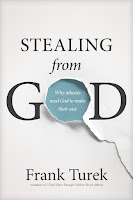Book Review- Stealing From God by Frank Turek
It is quite common for atheists to claim that science and reason are completely on their side and rule out the possibility of God's existence. While it is to be expected that atheists would recognize that certain philosophical foundations exist in the world they (and we) live in, it is not necessarily expected that they would understand that their explanation of reality (without God) is incompatible with such realities. Laying out that explanation is the goal of Frank Turek's book "Stealing From God." In order to be a logically consistent atheist, many of reality's foundations must be denied. And if they do not wish to deny them, then they must steal those foundations from God to argue against His existence.
Turek describes seven CRIMES that atheists commit against reality and their everyday life in order make their case against God (or even to attempt to explain reality without God). As he shows that reality demonstrates atheism to be false, he shows not only how each one provides a negative argument against atheism but a positive argument for God. In the final chapters Turek argues for the existence of not just any theistic God, but the God of Christianity- the true worldview.
In this review I'll go over some of the key points Turek makes throughout the book, provide several of my favorite quotes, and give my specific recommendations.


